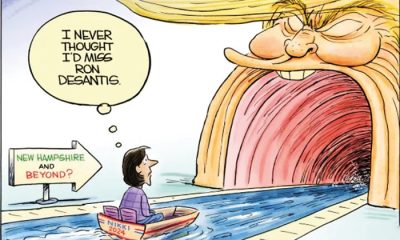Features
TRUMP: I COULD WIN CALIFORNIA AND NEW YORK IF JESUS – AND – GOD WOULD COME DOWN AS “ELECTION SCOREKEEPERS”

THE GREAT PROJECTOR
by Vijaya Chandrasoma
“The Great Dictator” (1940), the anti-war political satire, was the first black and white “talkie”, written, directed by and starring the incomparable Charlie Chaplin. Acclaimed as one of the greatest political satires/comedies ever made, it was based on a condemnation of Hitler and Mussolini, and their policies of authoritarianism and anti-Semitism that led to World War II.
Chaplin’s movie had a complementary ideological theme to George Orwell’s 1949 dystopian novel and cautionary tale, “1984”, which predicted what could happen if governments are allowed to manipulate facts to suit their narrative, providing an insight into the fearful choice faced by citizens living under an oppressive regime.
The Germans faced such a choice between authoritarianism and democracy in the 1930s. A choice they made based on the lies of a bigoted monster, Hitler, who, manipulating their patriotism, convinced them that Jews, the real enemy, had been planning the destruction of Germany since World War I. He persuaded them that The Final Solution, the genocide of Germany’s entire Jewish population, deemed to be vermin of impure blood, was the only answer. It was supposed to be an act of self-defense to preserve the glorious destiny of the Fatherland, the Master Race of Europe. The end, they were told, as savagely cruel as it was, justified the means. The tragedy is that many decent Germans pretended to be unaware of the horrors unfolding before their eyes.
Chaplin’s film was released in 1940, when the United States was at peace with Nazi Germany; a time when there was a wave of anti-Semitism in America, in accord with Hitler’s belief that Jews presented a threat to world peace and prosperity.
A fickle summary of the storyline of “The Great Dictator”, is used to draw a parallel with the Germany of the 1930s, and the imminent threat faced by America in 2024.
Chaplin, played the role of a lowly Jewish barber, known throughout the movie as The Barber. He bore a strong physical resemblance to Adenoid Hynkel (Adolf Hitler), the dictator of the imaginary fascist nation of Tomainia (Germany), also played by Chaplin. Hynkel, in collusion with Benzino Napaloni (Benito Mussolini), Dictator of Bacteria (Italy), was ruthlessly persecuting the Jews in Europe.
The climax of a complicated plot featured The Barber, impersonating Hynkel, making an impassioned speech to an adoring crowd of Hynkel supporters, announcing he had a change of heart. He exhorted his soldiers to shed their evil, murderous ways and fight for liberty, uniting Tomainia in the name of democracy.
Speaking as Hynkel, The Barber concluded his masterly epilogue thus:
“Then, in the name of democracy, let us use that power, let us all unite. Let us fight for a new world….To do away with national barriers, with greed, with hate and intolerance….Soldiers! In the name of democracy, let us all unite!”
That epilogue changed the course of Tomanian history. Hynkel supporters realized the dangers of the path they were treading. Forsaking the evil machinations of Dictator Hynkel, Tomainia continued to live in peace and harmony with all its citizens and neighbors.
The last scene in the movie shows Hannah, The Barber’s girlfriend, listening to his message of hope on the radio, saying that “The soul of man has been given wings, and at last he is beginning to fly. He is flying onto the rainbow, into the light of hope, into the future, the glorious future, that belongs to you, to me, and to all of us”. The film reaches its dramatic climax after the epilogue, when Hannah turns towards the brilliant sunlight, and says, “Listen”.
Unfortunately, the Germans didn’t listen. They made the wrong choice, believing the words of a bigoted madman, Hitler, plunging the world into the most violent military conflict in human history, a war that claimed the lives of 20 million combatants and at least 40 million civilians, including the genocide of six million Jews in Nazi gas chambers.
Today, we have a situation in the United States of America approaching the same choice that the mythical Tomainians faced in the 1930s. A situation where we, alas, have no Trump look-alike who can, like The Barber did in Tomainia, impersonate our own bigoted madman and save American democracy.
Wait! There’s hope. We may not need a look-alike or an impersonator. There’s every chance that Trump may destroy himself, at the rate he seems to be speeding towards lunacy/dementia, considering the nutjob nonsense he has been spewing recently. Like Jesus counting his votes! The day Jesus descends to earth, that’s the day Trump goes straight down to hell!
Seriously, though, this is not some drama-filled hyperbole predicting that the choice awaiting Americans next year will either see the continuation of our Great Experiment of Democracy, or plunge our society into the chaos that would have been the fate of the German people had Hitler prevailed in WW II. It’s just the plain, unadulterated truth.
(For aficionados of historical coincidences, Friedrich Trump, born in the Kingdom of Bavaria in Germany in 1869, was the patriarch of the Trump family, The Donald’s paternal grandfather. Born of humble stock, Friedrich too worked as a barber in Munich. He spread the lie that he was related to the Wittelsbach Dynasty, who ruled Bavaria at that time. He repeated this lie so often that his peers believed it, though the fact that he was as dumb as a rock, the village idiot, belied his claims to royalty. And even more coincidentally, he was exiled for the crime of dodging the military draft (bone spurs?) by the Bavarian government, and made his home in New York in the late 1880s.
Friedrich’s genius for transforming a lie into the truth, his cowardice in refusing to serve his country and his monumental stupidity have been the hallmarks of the Trump Dynasty, traits inherited in generous measure by The Donald).
Donald Trump won the presidency in 2016, exploiting the fears of the Christian white majority in the USA of rapid changes in the demographics of the nation, caused by the influx of legal and illegal immigrants, people of color, especially Latin Americans. These dark-skinned aliens are predicted to form the majority of America’s population by 2050, with the resultant erosion of privilege white Americans had enjoyed for centuries.
I am not going to detail the disastrous four years of the Trump administration; his tax cuts of $1.7 trillion which benefited only the super-wealthy; his immigration policies based on race and religion; his cruel policies of family separation of asylum seekers at the southern border, housed in overcrowded camps devoid of human amenities of hygiene and sustenance; his criminal mismanagement of the pandemic which caused avoidable deaths of over 600,000 Americans; and the economy he left adrift, with an explosive rise in the national debt of almost $7.8 trillion.
Nor am I going to dwell on the multiple felonies that Trump has been arrested and bailed, with a current score of 91 felonies in four separate jurisdictions.
The only fact that continues to amaze me is that, in spite of Trump’s obvious acts of corruption and criminal incompetence during his presidency; and subsequent crimes of fraud, sexual assault, sedition, obstruction of justice and espionage hanging over his head after his defeat in 2020; he still remains the prohibitive favorite for the Republican nomination for the 2024 presidency. The Party of Family Values and the Rule of Law tragically transformed into the modern version of Hitler’s Nazi Brownshirts. Swastikas and all.
But I will, very briefly, touch on recent public statements Trump made, which prove his attitude towards elections and abuse of power, and his evil genius for Projection, the old Nazi trick invented by Hitler’s Propaganda Minister, Joseph Goebbels, “accuse your enemy of the same crimes of which you are guilty”.
Last week, at a rally in Cedar Rapids, Iowa, addressing his Evangelist and white supremacist base, Trump made breathtaking statements about US elections, “that I would win even blue states like California and New York if Jesus Christ – and God – would simply come down and act as a scorekeeper for me”. When asked if he would be a dictator if he is reelected in 2024, he said, “Only for one day. I’ll only abuse power on the first day of my second term”.
And he made a Projection for the ages, almost Orwellian in its manipulative gaslighting, comparing himself to President Biden:
“If Joe Biden wants to make this race (for the presidency) a question of which candidate will defend our democracy and protect our freedoms, I say to Crooked Joe – and he is the most corrupt president we’ve ever had – we will win that fight, and win it very big.
“Joe Biden is not the defender of American democracy. Joe Biden is the destroyer of American democracy”.
These statements were met with with wild applause from his Evangelist and White Supremacist base.
The title of “Crooked, Corrupt Joe” has been bestowed upon President Biden by a convicted felon, arrested and on bail on 91 felonies! The mantle of “Destroyer of American Democracy”, again conferred on Biden by an indicted traitor, arrested and on bail for felonies of inciting an insurrection and espionage, who recently stated that he would terminate the constitution if elected – that’s pretty rich, even for Republicans turned Nazis.
Can Trump’s web of deceit and treachery succeed again? Of course it could, but only if Democrats don’t fight back, or keep fighting in ways that were honorable 20 years ago, but are obsolete now and destined to failure.
Democrats have not as yet realized that times have changed, that deception, lies, violence and death threats are now the new normal of election campaigns. If they continue taking knives to a gunfight, unless they stoop to somewhere near Trump’s level – plummeting to his depths is a human impossibility – and use all the criminal and treasonous ammunition they have against him and the Republican Party, they will be outwitted again, like they were in 2016.
The fourth Republican debate was held last Wednesday, which Donald Trump again did not attend. The participants were four Republican hopefuls who were all a distance behind Trump in the polls. The reason commonly given for Trump’s absence at these debates is that he has this huge lead over all his rivals. My opinion is that if he does attend, Republican candidates like Chris Christie, Nikki Haley, even Ron DeSantis will find the courage to attack Trump on his spectacular character flaws and crimes, even at the risk of antagonizing his base, perhaps gaining the support of moderate Republicans.
These are exactly Trump’s criminal and racist blemishes that Democrats should be shouting from the rooftops. There is no lack of ammunition: Trump’s despicable character, senile vacuity and treasonous crimes, the Republicans’ embrace of the white supremacist fears of the Great Replacement Theory, Abortion Rights and Contraception, Gun Control (especially after the 561st mass shooting in 2023 in Nevada last Wednesday), Voting Rights, Climate Change, LGBTQ rights and Gay Marriage, Taxation, Income and Wealth Inequality, the threat to Obamacare, Student Debt. All these rights and more will be under attack in a radical red MAGA (Make America Great Again) Republican administration.
These dangers to democracy under a Republican administration should be highlighted by every Democratic politician, at every available opportunity. And Democrats should not concentrate on winning just the presidency, they should aim at sweeping both Houses of Congress.
America is on the threshold of a struggle for its democratic life. And many decent Americans, like the Germans nearly a century ago, seem to be unaware of the dangers unfolding before their eyes. As Republican Liz Cheney wrote in her recent bestseller, Oath and Honor, “Americans are sleepwalking towards a dictatorship”.
Features
Electoral reform and abolishing the executive presidency

by Dr Jayampathy Wickramaratne,
President’s Counsel
The Sri Lankan Left spearheaded the campaign against introducing the executive presidency and consistently agitated for its abolition. Abolition was a central plank of the platform of the National People’s Power (NPP) at the 2024 presidential elections and of the Janatha Vimukthi Peramuna (JVP) at all previous elections.
Issues under FPP or a mixed system
President Anura Kumara Dissanayake, participating in the ‘Satana’ programme on Sirasa TV, recently reiterated the NPP’s commitment to abolition and raised four issues related to accompanying electoral reform.
The first is that proportional representation (PR) did not, except in a few instances, give the ruling party a clear majority, resulting in a ‘weak parliament’. Therefore, electoral reform is essential when changing to a parliamentary form of government.
Secondly, ensuring that different shades of opinion and communities are proportionally represented may be challenging under the first-past-the-post system (FPP). For example, as the Muslim community in the Kurunegala district is dispersed, a Muslim-majority electorate will be impossible. Under PR, such representation is possible, as happened in 2024, with many Muslims voting for the NPP and its Muslim candidate.
The third issue is a difficulty that might arise under a mixed (FPP-PR) system. For example, the Trincomalee district returned Sinhala, Tamil and Muslim candidates at successive elections. In a mixed system, territorial constituencies would be fewer and ensuring representation would be difficult. For the unversed, there were 160 electorates that returned 168 members under FPP at the 1977 Parliamentary elections.
The fourth is that certain castes may not be represented under a new system. He cited the Galle district where some of the ‘old’ electorates had been created to facilitate such representation.
It might straightaway be said that all four issues raised by President Dissanayake have substantial validity. However, as the writer will endeavour to show, they do not present unsurmountable obstacles.
Proposals for reform, Constitutional Assembly 2016-18
Proposals made by the Steering Committee of the Constitutional Assembly of the 2015 Parliament and views of parties may be referred to.
The Committee proposed a 233-member First Chamber of Parliament elected under a Mixed-Member Proportional (MMP) system that seeks to ensure proportionality in the final allocation of seats. 140 seats (60%) will be filled by FPP. The Delimitation Commission may create dual-member constituencies and smaller constituencies to render possible the representation of communities of interest, whether racial, religious or otherwise. 93 compensatory seats (40%) will be filled to ensure proportionality. Of these, 76 will be filled by PR at the provincial level and 12 by PR at the national level, while the remaining 5 seats will go to the party that secures the highest number of votes nationally.
The Sri Lanka Freedom Party agreed with the proposals in principle, while the Joint Opposition (the precursor of the Sri Lanka Podujana Peramuna) did not make any specific proposals. The Tamil Nationalist Alliance was willing to consider any agreement between the two main parties on the main principles in the interest of reaching an acceptable consensus.
The Jathika Hela Urumaya’s position was interesting. If the presidential powers are to be reduced, the party obtaining the highest number of votes should have a majority of seats. Still, the representation of minor political parties should be assured. Therefore, the number of seats added to the winning party should be at the expense of the party placed second.
The All Ceylon Makkal Congress, Eelam People’s Democratic Party, Sri Lanka Muslim Congress and the Tamil Progressive Alliance jointly proposed that the principles of the existing PR system be retained but with elections being held for 40 to 50 electoral zones and a 2% cut-off point. The Janatha Vimukthi Peramuna was for the abolition of the executive presidency and, interestingly, suggested a mixed electoral system that ensures that the final outcome is proportional.
CDRL proposals
The Collective for Democracy and Rule of Law (CDRL), a group of professionals and academics that included the writer, made detailed proposals on constitutional reform in 2024. It proposed returning to parliamentary government. The legislature would be bicameral, with a House of Representatives of 200 members elected as follows: 130 members will be elected from territorial constituencies, including multi-member and smaller constituencies carved out to facilitate the representation of social groups of shared interest; Sixty members will be elected based on PR at a national or provincial level; Ten seats would be filled through national-level PR from among parties that failed to secure a seat through territorial constituencies or the sixty seats mentioned above, enabling small parties with significant national presence without local concentration to secure representation. Appropriate provisions shall be made to ensure adequate representation of women, youth and underrepresented interest groups.
The writer’s proposal
The people have elected the NPP leader as President and given the party a two-thirds majority in Parliament. It is, therefore, prudent to propose a system that addresses the concerns expressed by the President. Otherwise, we will be going around in circles. The writer believes that the CDRL proposals, suitably modified, present a suitable basis for further discussion.
While the people vehemently oppose any increase in the number of MPs, it would be challenging to address the President’s concerns in a smaller parliament. The writer’s proposal is, therefore, to work within a 225-member Parliament.
The writer proposes that 150 MPs be elected through FPP and 65 through national PR. 10 seats would be filled through national-level PR from among parties that have not secured a seat either through territorial constituencies or the 65 seats mentioned above. The Delimitation Commission shall apportion 150 members among the various provinces proportionally according to the number of registered voters in each province. The Commission will then divide each province into territorial constituencies that will return the number of MPs apportioned. The Commission may create smaller constituencies or multi-member constituencies to render possible the representation of social groups of shared interest.
The 65 PR seats will be proportionally distributed according to the votes received by parties nationally, without a cut-off point. The number of ‘PR MPs’ that a party gets will be apportioned among the various provinces in proportion to the votes received in the provinces. For example, if Party A is entitled to 10 PR seats and has obtained 20% of its total vote from the Central Province, it will fill 2 PR seats from candidates from that Province, and so on. Each party shall submit names of potential ‘PR MPs’ from each of the provinces where the party contests at least one constituency in the order of its preference, and seats allotted to that party in a given province are filled accordingly. The remaining 10 seats will be filled by small parties as proposed by the CDRL.
How does the proposed system address President Dissanayake’s concerns?
The President’s concern that PR will result in a weak parliament is sufficiently addressed when a majority of MPs are elected under FPP.
Before dealing with the other three issues, it must be said that voters do not always vote for candidates from their communities. A classic example is the 1965 election result in Balapitiya, a Left-oriented constituency dominated by a particular caste. The Lanka Sama Samaja Party boldly nominated L.C. de Silva, from a different caste, to contest Lakshman de Silva, a long-standing MP who crossed over to bring down the SLFP-LSSP coalition. Balapitiya voters punished Lakshman and elected L.C.
Multi-member constituencies have generally served their purpose but not always. The Batticaloa dual-member constituency had been created to ‘render possible’ the election of a Tamil and a Muslim. At the 1970 elections, the four leading candidates were Rajadurai of the Federal Party, Makan Markar of the UNP, Rahuman of the SLFP and the independent Selvanayagam. The Muslim vote was closely split between Macan Markar and Rahuman, resulting in both losing. Muslim voters surely knew that a split might deny Muslim representation but preferred to vote according to their political convictions.
The President’s second concern that a dispersed community may not get representation under FPP will also be addressed better under the proposed system. Taking the same Kurunegala district as an example, a party could attract Muslim voters by placing a Muslim high up on the PR list. Similarly, a Tamil party could place a candidate from a depressed community high up in its Northern Province PR list to attract voters of depressed communities and ensure their representation.
The third concern was that the number of electorates would be less under a mixed system, making it challenging to carve out electorates to facilitate the representation of communities, the Trincomalee district being an example. Empowering the Delimitation Commission to create smaller electorates assuages this concern. It will not be Trincomalee District but the whole Eastern Province to which a certain number of FPP MPs will be allotted, giving the Commission broad discretion to carve out electorates. The Commission could also create multimember constituencies to render possible the representation of communities of interest. The fourth concern about caste representation would also be addressed similarly.
It may be noted that the difference between the number of FPP MPs (150) under the proposed system is only 10% less than that under the delimitation of 1975 (168). Also, there will be no cut-off point for PR as against the present cut-off of 5%. This will help small as well as not-so-small parties. Reserving 10 seats for small parties also helps address the concerns of the President.
No spoilers, please. Don’t let electoral reform be an excuse for a Nokerena Wedakama
The writer submits the above proposals as a basis for discussion. While a stable government and the representation of various interests are essential, abolishing the dreaded Executive Presidency is equally important. These are not mutually exclusive.
President Dissanayake also said on Sirasa TV that once the local elections are over, the NPP would first discuss the issue internally. This is welcome as there would be a government position, which can be the basis for further discussion.
This is the first time a single political party committed to abolition has won a two-thirds majority. Another such opportunity will almost certainly not come. Let there be no spoilers from either side. Let electoral reform not be an excuse for retaining the Executive Presidency. Let the Sinhala saying ‘nokerena veda kamata konduru thel hath pattayakuth thava tikakuth onalu’ not apply to this exercise (‘for the doctoring that will never come off, seven measures and a little more, of the oil of eye-flies are required’—translation by John M. Senaveratne, Dictionary of Proverbs of the Sinhalese, 1936).
According to recent determinations of the Supreme Court, a change to a parliamentary form of government requires the People’s approval at a referendum. While the NPP has a two-thirds majority, it should not take for granted a victory at a referendum held late in the term of Parliament for, then, there is the danger of a referendum becoming a referendum on the government’s performance rather than one on the constitutional bill, with opposition parties playing spoilers. If the government wishes to have the present form of government for, say, four years, it could now move a bill for abolition with a sunset clause that provides for abolition on a specified date. Delay will undoubtedly frustrate the process and open the government to the accusation that it indulged in a ‘nokerena vedakama’.
Features
Did Rani miss manorani ?
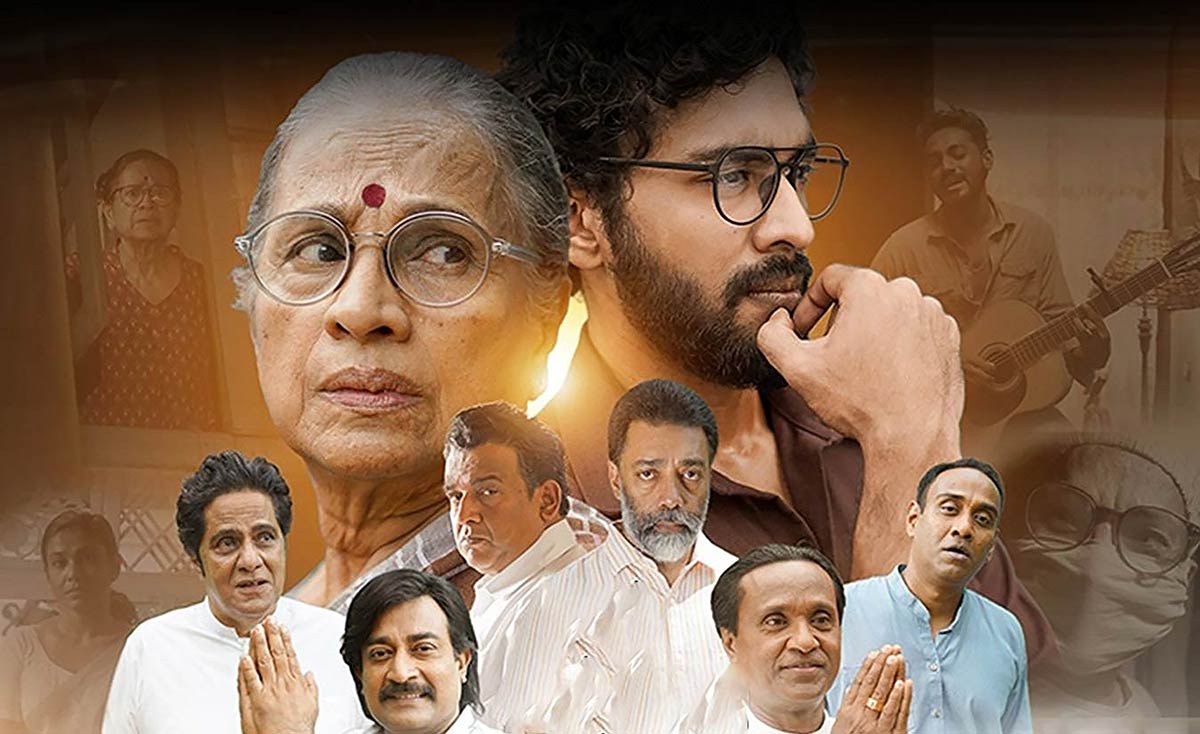
(A film that avoids the ‘Mannerism’ of a Biopic: Rani)
by Bhagya Rajapakshe
bhagya8282@gmail.com
This is only how Manorani sees Richard. It doesn’t have a lot of what Richard did. Although Manorani is not someone who pays attention to the happenings in the country. It was only after her son was kidnapped that she began to feel that this was happening in the country.She had human emotions. But she was a person who smoked cigarettes and drank whiskey and lived a merry life.”
(Interview with “Rani” film director Ashoka Handagama by Upali Amarasinghe – 02.02.2025 ‘Anidda’ weekend newspaper, pages 15 and 19)
The above statement shows the key attitude of the director of the movie, “Rani” towards the central character of the film, Dr. Manorani Sarawanamuttu. This statement is highly controversial. Similarly, the statement given by the director to Groundviews on 30.01.2025 about capturing the depth of Rani’s character shows that he has done so superficially, frivolously?
A biopic is a specific genre of cinema. This genre presents true events in the life of a person (a biography), or a group of people who are currently alive or who belong to history with recognisable names. The biopic genre often artistically and cinematically explores keenly the main character along with a few secondary characters connected to the central figure. World cinema is proof that even if the characters are centuries old, they are carefully researched and skilled directors take care to weave the biographies into their films without causing any harm or injustice to the original character.
According to the available authentic reports, Manorani Saravanamuthu was a professionally responsible medical doctor. Chandri Peiris, a close friend of her family, in his feature article on Manorani in the ‘Daily Mirror’ newspaper on 06th November 2021, says this about her:
“She was a doctor who had her surgeries in the poorest areas around Colombo which made her popular with communities who preferred their women to be seen by female doctors. She had a wonderful manner with her patients which my mother described by saying, ‘looking at her is enough to make you well …. When it came to our outlandish group of friends, she was always there to steer many of us through some very personal issues such as: unplanned pregnancies, teenage pregnancies, mental breakdowns, STD’s, young lovers who ran away and married, depression, circumcisions, break-ups, fractures, dance injuries, laryngitis (especially among the actors and singers) fevers, pimples, and even the odd boil on the bum.”
But the image of Rani depicted by Handagama in his film is completely different from this. According to the film, a major feature of her life consisted of drinking whiskey and smoking cigarettes. Her true role is unspoken, hidden in the film. A grave question arises as to whether the director spent adequate time doing the research? to find out who Manorani really was. In his article Chandri Peiris further says the following about Manorani:
“Soon after the race riots in 1983, Manorani (along with Richard) helped a great many Sri Lankan Tamils to find refuge in countries all over the world. Nobody knew about this. But all of us who used to hang around their house kept seeing unfamiliar people come over to stay a few days and then leave. Among them were the three sons of the Master-in-Charge of Drama at S. Thomas’ College, who were swiftly sent abroad by the tireless efforts of this mother and son. It was then that we worked out that their home was a safehouse. … Manorani was vehemently opposed to the terror wreaked by the LTTE and always wanted Sri Lanka to be one country that was home to the many diverse cultures within it. When the ethnic strife developed into a full-on war with those who wanted to create a separate state for Tamil Eelam, she remained completely against it.”
According to the director of the film, if Rani had no awareness of what was happening in the country and the world, how could she have helped the victims survive and leave the country during that life-threatening period? It is clear from all this that the director has failed to fully study the character of Manorani and what she did. There is a scene where Manorani watches a Sinhala stage play with much annoyance and on her way back home with Richard, she is shown insensitively avoiding Richard’s friend Gayan being assaulted by a mob. This demeanour does not match the actual reports and information published about Manorani. How did the director miss these records? It shows his indifference to researching background information for a film such as this. He clearly does not think that research is essential for a sharp-witted artist in creating his artwork. In his own words, he told the Anidda newspaper:
“But the information related to this is in the public domain and the challenge I had was to interpret that information in the way I wanted. I am not an investigative journalist; My job is to create a work of art. That difference should be understood and made.”
And according to the director, “I was invited to do the film in 2023. The script was written within two to three months and the shooting was planned quickly.” Thus, it is clear that there has been no time to study the inner details related to Manorani, the main character of the film, or the character’s Mannerism. Professor Sarath Chandrajeewa, who published a book with two critical reviews on Handagama’s previous film ‘Alborada’, emphasises in both, that ‘Alborada’ also became weak due to the lack of proper research work’ (Lamentation of the Dawn (2022), pages 46-57).
Directors working in the biopic genre with a degree of seriousness consider it their responsibility to study deeply and construct the ‘mannerism’ of such central characters to create a superior biographical film. For example, in Kabir Khan’s 2021 film ’83’ the actor Tahir Raj Bhasin, who played the role of Sunil Gavaskar, said that it took him six months to study Sunil Gavaskar’s unique style characteristics or Mannerism.
Also, Austin Butler, the actor who played the role of Elvis Presley in the movie ‘Elvis’ directed by Buz Luhrmann and released in 2022, said in a news conference: After he started studying the character of Elvis, he became obsessed with the character, without meeting or talking to his family for nearly one year, while making the film in Australia before, during Covid and after.
‘Oppenheimer’ (2023) was written and directed by Christopher Nolan, in which Cillian Murphy plays the role of Oppenheimer. Nolan read and studied the 700-page story about Oppenheimer called ‘American Prometheus’ . It is said that it took three months to write the script and 57 days for shooting, and finally a two-hour film was created. The rejection of such intense studies by our filmmakers will determine the future of cinema in this country.
Acting is the prime aspect of a movie. The character of Manorani is performed very skillfully in the movie. But certain of her characteristics and mannerism become repetitive and in their very repetitiveness become tiresome to watch. For example, right across the film Manorani is shown smoking, drinking alcohol, sitting and thinking, going towards a window and thinking and smoking again. It would have been better if it had been edited. The audience is thereby given the impression that Manorani lives on cigarettes and whiskey. Although smoking and drinking alcohol is a common practice among some women of Manorani’s social class, it is depicted in the film so repetitively that it creates a sense of revulsion in the viewer. In the absence of close-ups and a play of light and dark, Manorani’s mental states cannot be seen in their intense three dimensionality. It is a question whether the director gave up directing and let the actress play the role of Manorani as she wished. At the beginning of the film, close-ups of Manorani appear with the titles but gradually become normal camera angles in the film. This avoids the use of close-ups of Manorani’s face to show emotion in the most shocking moments in the film. Below are some films that demonstrate this cinematic technique well.
‘Three Colours: Blue’ (1993) French, Directed by Kryzysztof Kies’lowski.
‘Memories in March’
(2010) Indian, Directed by Sanjoy Nag.
‘Manchester by the Sea’
(2016) English, Directed by Keneth Lonergan.
‘Collateral Beauty’
2016) English, Directed by David Frankel.
Certain characters appear in the film without any contribution to building Manorani’s role. Certain scenes such as the Television news, bomb explosions, dialogue scenes where certain characters interview Manorani are not integrated into the film’s narrative and feel forced. The scene with the group of hooligans in a jeep at the end of the film is like a strange tail to the film.
Richard’s sexual orientation, which is hinted at the end of the film by these thugs in the final scene, is an insult to him. It is a great disrespect to those characters to present facts without strong information analysis and to tell the inner life of those characters while presenting a real character through an artwork with real names. The director should not have done such humour and humiliation.
There is some thrill in seeing actors who resemble the main political personalities of that era playing those roles in the film. In this the film has more of a documentary than a fictional quality but it barely marks the socio-political history of this country during the period of terror in 88-89. The character of Manorani was created as a person floating in that history ungrounded, without a sense of gravity.
The film’s music and vocals are mesmerising. But unfortunately, the song ‘Puthune’ (Dearest Son), which has a very strong lyrical composition, melody and singing, is placed at the end of the film, so the audience does not know its strength. This is because the audience starts to leave the cinema as soon as the song starts, when the closing credits scrolled down. If the song had accompanied the scene on the beach where we see Manorani for the last time, the audience would have felt its strength.
Manorani’s true personality was a unique blend of charm, sensitivity, compassion, intelligence, warmth and fun, which enhanced her overall beauty, as evidenced by various written accounts of her. Art critics and historians H. W. Johnson and Anthony F. A Johnson state in their book ‘History of Art’ (2001), “Every work of art tells whether it is artistic or not. And the grammar and structure of the form will signal to us that.”
Features
Precautionary methods; cooked up insults

 Topic of the moment is security and its major subsection public security and the country’s security. The police admitted it had lapsed in the tightness of its security when drug kingpin Ganemulla Sanjeeva was shot point blank in the dock at the Colombo Magistrate’s Court. The police however were very speedy in the apprehension of the shooter and several accomplices. The crime was meticulously planned and carried out with a gun smuggled into the court in a hollowed-out book.
Topic of the moment is security and its major subsection public security and the country’s security. The police admitted it had lapsed in the tightness of its security when drug kingpin Ganemulla Sanjeeva was shot point blank in the dock at the Colombo Magistrate’s Court. The police however were very speedy in the apprehension of the shooter and several accomplices. The crime was meticulously planned and carried out with a gun smuggled into the court in a hollowed-out book.
The murder of a lawbreaker as he rode his motorbike with two of his children was another episode in the recent spate of druggies battling it out among themselves and hiring gunmen to do the dirty. Sympathy is all for those two innocent kids who died in the attack.
Then Yukthiya, now competent sleuthing and hard work
Cassandra’s take on this recent heightened gang violence is that the big sharks were apprehended by the police or are about to be and so they, suspecting co-drug gangsters of ratting to law enforcement officers, engage in their killing sprees. And, here is a significant theory of hers: the police and CID are actually doing what they are supposed to do: catch wrongdoers, with no interference from politicians, the new government being such.
Remembered well is project Yukthiya, announced with fanfare by the Minister of Security in Ranil W’s SLPP government – Tiran Alles; seconded by acting IGP Deshabandu Tennakoon, that the drug menace in Sri Lanka would be wiped out. We expected at least one drug lord to be apprehended. No, the police, almost on the rampage, caught very many kuunissas and haalmessas who had a packet of drugs in the pocket, or a woman with a small parcel hidden in her roof. The thalmahas jeering loudly continued to luxuriously lord it in Dubai and other places directing sale of their drugs and murders back home. Cass was sure, in her extravagantly suspicious mind, they paid much to continue living free. Don’t ask her where this sort of kappan went – to which pocket/s.
Very different now. No fanfare, no extravagant promises, no bribe taking. Strong man at head to whom justice, fair play and each-man-does-his-duty are policies followed. More drug lords have been apprehended and extradited to SL in the past couple of months than the two years of Yukthiya. A farce.
But all sensible, concerned Sri Lankans will agree that tighter and extremely competent security must be given to the Prez, PM, Ministers and more so those connected to law, order and being spokesmen for the government; judges and VVIPs in other departments.
The President and the Prime Minister especially must curtail their appearances in public for at least a short while and walkabouts and too close contact with crowds must be taboo. Times are bad for them, not the people of the land as a whole. There definitely are persons who will not blink an eyelid in doubt or hesitation to murder a VVIP in this government and cause chaos in a land that is slowly being led to economic stability and social peace. Yes, Cassandra of today cries like her ancestor but a slightly different tune: “I do NOT want to see blood.
Too much has already been shed: thousands of Lankan youth, police officers; Richard, Lasantha, Wasim Thajudeen and many farmers made suicidal with ban of chemical fertilisers. We have gone through too many hells on earth: uprisings of 1971 and 1989; the LTTE and war; killing of those who were believed to pose competition to a strong man of two to three decades ago. We are at long last on the brink of stability and peace. Long cry but from a sincere and sensible heart, echoing very many others.
A dirty distortion
Let’s go overseas, since our collective blood pressure has risen with the first part of this Cry. Cass got a video clip on her mobile phone with the message: “Very sad to watch”. The scene is purportedly of the end of the inauguration of Trump as 47th US President on Monday January 20, 2025. On the last step stands Trump, slightly back his wife in that sort of black bowler hat that covered her entire forehead, Biden and very close to him, his wife Jill. “He looks absolutely pathetic as age really caught up.” The video rolls on.
Biden: Er, and now what?
Jill (sharply); We get in the helicopter.
Biden: And what is a helicopter?
Trump (Strong voice): It’s a thing that goes like this. Don’t worry Joe. It will take you across the blue American sky and safely to your home.
It is too stupid and sad to report verbatim.
Biden asks where his home is. Then Trump says your wife will look after you. Biden says; Housewife, first lady of my heart. He is even made to implore: Why have I to leave?
The moment Cass heard the short conversation, she threw her phone away. Why allow such trash? Such a conversation never would have occurred since Biden had just before proclaimed some regulations and. though he made a faux pas or to in what he said and did, he definitely was not senile and childish as the video shows. Such fake videos can easily be created.
The short acts or humour our people create are so sophisticated and usually not cheap and mean. Of course, that brings to mind that a parody or statement with slightly different emphasis or connotation killed a superbly talented young man in the most gruesome manner. During R Premadasa’s presidency a complimentary placard appeared pasted all over. If Cass recollects correctly the wording went thus: Who is he? What is he doing? Richard de Zoysa borrowed it and gave it a slight twist in connotation. He was tortured, killed and dropped in the sea to disappear forever. The compassionate waves washed him ashore, at least so his mother could see her beloved son, cold, dead and gone forever, but to be buried and not merely lost at sea. Bereaved women of the land who had their men disappearing were helped by her. They banded together so their pleas rose high and were heard overseas.
May such cruel and unjust times never visit us again. Tourists of all types and writers from foreign lands praise our land for its glorious beauty and variety and us the people as friendly and now serene. Let it remain so and our land gain in stability, serenity and serendipity.
-

 Business4 days ago
Business4 days agoSri Lanka’s 1st Culinary Studio opened by The Hungryislander
-

 Sports5 days ago
Sports5 days agoHow Sri Lanka fumbled their Champions Trophy spot
-

 News6 days ago
News6 days agoSC notices Power Minister and several others over FR petition alleging govt. set to incur loss exceeding Rs 3bn due to irregular tender
-

 Features5 days ago
Features5 days agoThe Murder of a Journalist
-
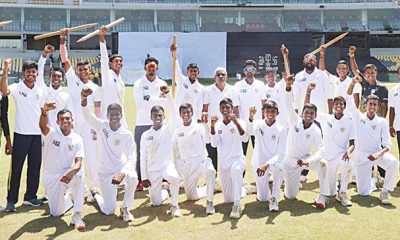
 Sports5 days ago
Sports5 days agoMahinda earn long awaited Tier ‘A’ promotion
-
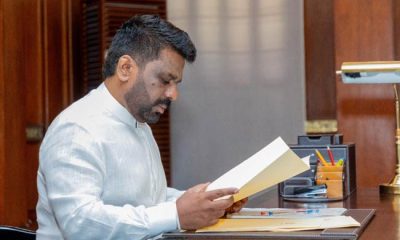
 Features5 days ago
Features5 days agoExcellent Budget by AKD, NPP Inexperience is the Government’s Enemy
-

 News6 days ago
News6 days agoMobile number portability to be introduced in June
-
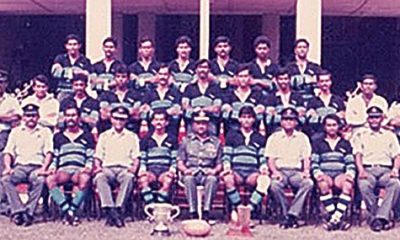
 Sports4 days ago
Sports4 days agoAir Force Rugby on the path to its glorious past








